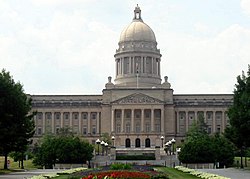Frankfort, Kentucky
| Frankfort | |
|---|---|
| City | |

|
|
 Location in Franklin County and the state of Kentucky |
|
| Location in the United States | |
| Coordinates: 38°12′N 84°52′W / 38.200°N 84.867°W | |
| Country | United States |
| State | Kentucky |
| County | Franklin |
| Established | 1786 |
| Incorporated | February 28, 1835 |
| Government | |
| • Type | Council/Manager |
| • Mayor | William May |
| Area | |
| • Total | 14.6 sq mi (37.9 km2) |
| • Land | 14.3 sq mi (37.1 km2) |
| • Water | 0.3 sq mi (0.8 km2) |
| Elevation | 509 ft (155 m) |
| Population (2010) | |
| • Total | 25,527 |
| • Density | 1,746.3/sq mi (674.2/km2) |
| Time zone | Eastern (EST) (UTC-5) |
| • Summer (DST) | EDT (UTC-4) |
| ZIP Code | 40601-40604, 40618-40622 |
| Area code(s) | 502 |
| FIPS code | 21-28900 |
| GNIS feature ID | 0517517 |
| Website | City website |
Frankfort is the capital city of the Commonwealth of Kentucky and the seat of Franklin County. Based on population, it is the fifth-smallest state capital in the United States. It is a home rule-class city in Kentucky; the population was 25,527 at the 2010 census. Located along the Kentucky River, Frankfort is the principal city of the Frankfort, Kentucky Micropolitan Statistical Area, which includes all of Franklin and Anderson counties.
The town of Frankfort likely received its name from an event that took place in the 1780s. American Indians attacked a group of early European-American pioneers from Bryan Station, who were making salt at a ford in the Kentucky River. Pioneer Stephen Frank was killed, and the settlers thereafter called the crossing "Frank's Ford." This name was later elided to Frankfort.
In 1786, James Wilkinson purchased the 260-acre (1.1 km2) tract of land on the north side of the Kentucky River, which developed as downtown Frankfort. He was an early promoter of Frankfort as the state capital.
After Kentucky became the 15th state in early 1792, five commissioners from various counties were appointed on June 20 to choose a location for the capital. They were John Allen and John Edwards (both from Bourbon County), Henry Lee (from Mason), Thomas Kennedy (from Madison), and Robert Todd (from Fayette). A number of communities competed for this honor, but Frankfort won. According to early histories, the offer of Andrew Holmes' log house as capitol for seven years, a number of town lots, £50 worth of locks and hinges, 10 boxes of glass, 1,500 pounds of nails, and $3,000 in gold helped the decision go to Frankfort.
...
Wikipedia


